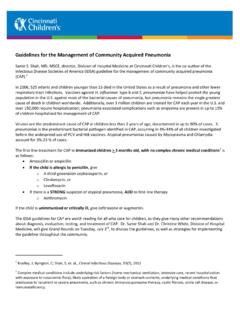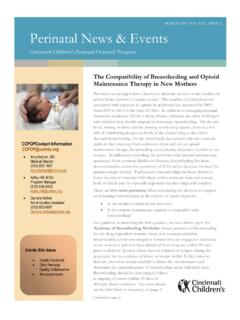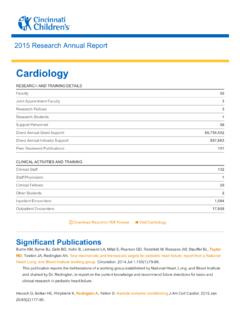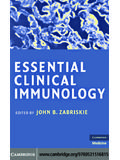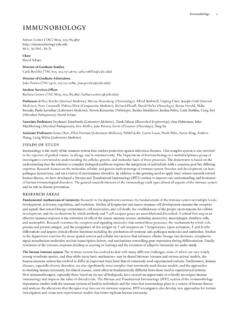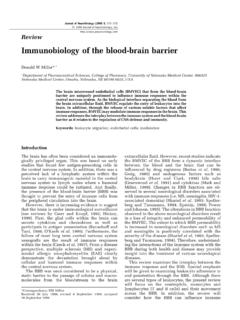Transcription of FY15 Research Annual Report | Immunobiology
1 2015 Research Annual ReportClick to view membersImmunobiologyRESEARCH AND TRAINING DETAILSF aculty19 Research Fellows18 Research Students19 Support Personnel29 Direct Annual Grant Support$3,873,956 Direct Annual Industry Support$78,897 Peer Reviewed Publications49 CLINICAL ACTIVITIES AND TRAININGC linical Fellows1 Download Report in PDF Format Visit ImmunobiologyResearch HighlightsResearch AdvancesThe Division of Immunobiology continues to play a critical role in pursuing fundamental Research explorations in theimmune system and the applications of such insights to the understanding and treatment of inflammatory and autoimmunedisorders. Several recent findings of our faculty are particularly noteworthy. Given the excitement and rapid advances intumor immunotherapy, Dr. Janssen and colleagues have shown that anti tumor CD8 T cell responses are criticallydependent on type I IFN production by dendritic cells after sensing DNA that is released from cryoablation of tumors, viathe STING TBK1 IRF3 pathway.
2 The results suggest that the STING pathway could be targeted to modify the magnitudeand nature of the immune responses to tumor associated antigens. Dr. Lewkowich and colleagues have gained newinsights into PD 1 signaling in T cells. They have shown that blocking PD 1 signaling in experimental asthma enhancesdisease severity, not by modifying the intensity of the inflammatory Th2 response, but by relieving the inhibitory influence ofPD 1 on the development of a disease modifying Th17 response. Blockade of PD 1 is proving to be of remarkabletherapeutic benefit for a diverse set of tumors and the results from the Lewkowich lab suggest an underlying cellular Fred Finkelman and Rick Straight, along with their colleagues, have demonstrated that certain Ig isotypes that poorlyaggregate pathogens or activate complement and weakly bind to stimulatory Fc receptors can be protective in suppressingdiseases mediated by immune complexes.
3 These results imply that antibodies such as human IgG4 might be useful fortreating people who have diseases caused by more pro inflammatory antibody Promotions and AwardsIn the past year, Drs. Kasper Hoebe and Edith Janssen were promoted to associate professors with tenure, and LeeGrimes became a full professor. In each case, the promotions were richly deserved as they reflected substantial researchaccomplishments that were recognized by testimonials from leading faculty at other institutions. All three continue toprovide exemplary service within and outside of the Institution. Kasper Hoebe was recognized as a highly cited researcherin The World's Most Influential Scientific Minds 2014. Fred Finkelman was awarded the Daniel Drake Medal by theUniversity of Cincinnati College of RecruitmentTwo new faculty were recruited to the division in the past year.
4 Theresa Alenghat completed her PhD and postdoctoralresearch at the University of Pennsylvania before joining Cincinnati Children's faculty as an assistant professor within theUniversity of Cincinnati College of Medicine. Her Research focuses on host microbe interactions and she is currentlyexploring molecular mechanisms that underlie how the microbiota regulates health and disease. Her Research may lead tonew treatments for disorders in which the host microbiota interactions are dysregulated such as in allergy, diabetes, andinflammatory bowel disease. Theresa was among 22 top next generation scientists to be recognized for their potentialin biomedical sciences with a PEW Scholar s Herr joined the division as an associate professor with an affiliate appointment in the Division of InfectiousDiseases. Before joining the faculty at Cincinnati Children's, Andrew was an Ohio Eminent Scholar in Structural Biology atthe University of Cincinnati College of Medicine and served as an associate director of the Cincinnati Medical Scientist(MD/PhD) Training Program.
5 Dr. Herr received the 2014 Emerging Entrepreneurial Achievement Faculty Award from theUniversity of Cincinnati for his work to commercialize a novel anti infective therapy based on his lab s Research . Dr. Herrsolved the first structure of a human IgA1 antibody bound to its cognate Fc receptor while a postdoctoral fellow at Caltech,and his lab has continued to study antibodies and immune receptors implicated in autoimmune diseases. The Herr Labalso studies mechanisms of bacterial pathogenesis. They have discovered a zinc dependent mechanism of intercellularadhesion in bacterial biofilms formed by Staphylococcus epidermidis and S. aureus. Biofilms are specialized bacterialcolonies that are highly resistant to antibiotics and therefore developing novel therapies to prevent biofilm formation is ofhigh clinical disciplinary CollaborationsFaculty in the division spearheaded two inter disciplinary collaborative proposals that were selected by the AcademicResearch Committee (ARC) for support through a new internal funding mechanism.
6 Senad Divanovic, teaming up withDrs. Takahisa Nakamura in the Division of Endocrinology and Tom Inge in the Division of Pediatric General and ThoracicSurgery have successfully launched a major Research initiative in obesity and inflammation. Drs. Dave Hildeman,Jonathan Katz, Mike Jordan and Harinder Singh collaborated with Lara Danziger Isakov in the Division of InfectiousDiseases and John Bucuvalas in the Division of Gastroenterology, Hepatology and Nutrition to establish a Center forTransplantation Immunology. A Research retreat was organized by Drs. John Perentesis in the Cancer and Blood DiseasesInstitute (CBDI), James Geller in the CBDI, Edith Janssen and Harinder Singh to nucleate Research and clinical efforts intumor immunotherapy. Discussions that have begun are expected to yield concrete Research initiatives in the comingacademic Retreat and Seminar SeriesAs in years past, the Division of Immunobiology played the lead role in organizing the Annual Immunology retreat.
7 Theevent was expanded to a day and a half at the Shawnee Lodge and Conference Center in Portsmouth, OH, and featuredresearch presentations from accomplished graduate students and postdoctoral fellows as well as faculty. It broughttogether approximately 140 participants from various divisions, including Allergy and Immunology, Asthma Research ,Infectious Diseases, Neonatology, Pulmonary Biology, Gastroenterology, Hepatology and Nutrition Research and theCenter for Autoimmune Genomics and Etiology. Immunology, Allergy and Rheumatology colleagues from UC alsoparticipated. This retreat has now become the key Annual event to showcase the breadth and depth of immunologyresearch at Cincinnati Children's and UC. It is instrumental in spawning new Research interactions and collaborations. Toenhance academic interactions within the immunology community the division organized and hosted a substantial numberof prominent seminar speakers from other institutions including Drs.
8 Steve Smale (UCLA), Rafael Casellas (NIH), DavidArtis (U Penn), Katherine Siminovitch (U Toronto), Barry Sleckman (Wash U), Alexander Rudensky (Memorial SloanKettering), Ellen Rothenberg (Caltech), Anjana Rao (LIAI), Al Singer (NIH) and David Baltimore (Caltech).Significant PublicationsKlarquist J, Hennies CM, Lehn MA, Reboulet RA, Feau S, Janssen EM. STING mediated DNA sensing promotes antitumorand autoimmune responses to dying cells. J Immunol. 2014 Dec 15 193(12):6124 immune responses to self antigens released by dying cells play a critical role in the development ofautoimmunity, allograft rejection, and spontaneous as well as therapy induced tumor rejection. Janssen andcolleagues show that the induction of this adaptive immune response is critically dependent on type I IFN production bydendritic cells upon sensing DNA from dying cells via the STING TBK1 IRF3 pathway.
9 Targeting this pathway improvedanti tumor responses and interfered with disease progression in experimental models of autoimmune these findings identify the STING pathway as a novel target to modify the magnitude and nature of theimmune responses to cell associated self JW, Lajoie S, Dienger K, Sproles AA, Richgels PK, Yang Y, Khodoun M, Azuma M, Yagita H, Fulkerson PC, Wills Karp M, Lewkowich IP. Differential control of CD4(+) T cell subsets by the PD 1/PD L1 axis in a mouse model of allergicasthma. Eur J Immunol. 2015 Apr 45(4):1019 1 is expressed by exhausted CD8+ T cells in chronic viral infections and markedly inhibits CD8+T cell activity,limiting the ability of these cells to clear virus. While also expressed by activated CD4+ T cells, the role of its PD 1 inregulating individual CD4 T cell subsets is not well defined. Work from the Lewkowich Lab demonstrates that PD 1does not provide an inhibitory signal to all CD4 T cell subsets.
10 PD 1 does limit cytokine production by effector Th1 andTh17 cells and permanently reduces cytokine producing capacity if engaged during Th1/Th17 differentiation. However,in Th2 cells, PD 1 engagement enhances GATA3 expression, increasing cytokine production by established anddeveloping cells and supporting Th2 differentiation under non polarizing conditions. Despite this Th2 enhancingactivity, blocking PD 1/PD L1 in experimental asthma enhances disease severity, not by modifying the intensity of the++Th2 response, but by relieving the inhibitory influence of PD 1 on the development of a disease modifying Th17response. These studies highlight the complex of role of PD 1 in immune regulation, and with the advent of PD 1blocking therapy for the treatment of solid tumors, a greater recognition of this complexity is an important O, Sholl A, Bleesing JJ, Hildeman DA.
